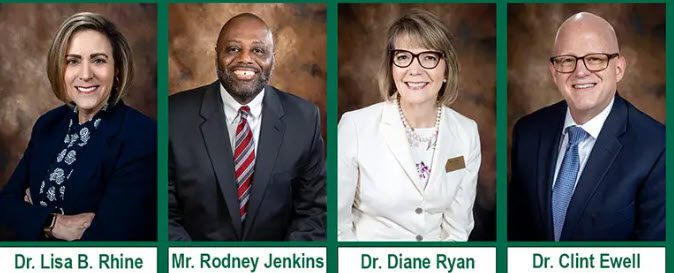Author Archive for R. Oliphant – Page 27
NURSING PROGRAM DOMINATES FALL 2023 REGISTRATIONS AT YAVAPAI COMMUNITY COLLEGE’S VERDE VALLEY CAMPUS
YAVAPAI COMMUNITY COLLEGE’S 2023 VOLLEYBALL TEAM WELCOMES 18 NEW ATHLETES; NO ONE RETURNING FROM LAST YEAR’S TEAM; FIVE RECRUITS FROM FOREIGN COUNTRIES (THREE FROM YAVAPAI COUNTY)
Adds three students from Poland, one from Turkey, and one from Montenegro; Recruits also come from Montana, Florida and Utah
 Yavapai Community College has set the stage for an exciting season as it welcomes 18 talented student-athletes to its 2023 Volleyball team. This is the second year for head coach Chelsey Lucas and assistant coach Zaquae Downtown.
Yavapai Community College has set the stage for an exciting season as it welcomes 18 talented student-athletes to its 2023 Volleyball team. This is the second year for head coach Chelsey Lucas and assistant coach Zaquae Downtown.
One remarkable aspect of this year’s recruiting effort is the exceptional diversity within the team. Hailing from various corners of the globe, five gifted student-athletes have made Yavapai their new home, arriving from countries as far-reaching as Poland, Turkey, and Montenegro. Additionally, the team has tapped into talent pools in different states, successfully recruiting standouts from Florida, Utah, and Montana. This melting pot of talent promises to bring a fascinating mix of playing styles and cultural influences to the volleyball court.
Three outstanding student-athletes have been selected from Yavapai County itself, constituting approximately 17% of the team. While the number from the County fell short of the 25% target set by the athletic department, the dedication and passion of these homegrown players should add a special flair to the team’s composition.
As the 2023 Volleyball season approaches, anticipation and excitement build around this diverse and talented group of athletes.
The following is a list of the members of the 2023 Volleyball team:
Bella Reach | Outside Hitter | Freshman | Cave Creek, Arizona. High School: Reach graduated from Cactus Shadows High School in May of 2023. Personal: Reach was born in Scottsdale, Arizona, on November 13, 2004.
Jezebel Rivas | Libero | Freshman | Goodyear, Arizona. High School: Rivas graduated from Millennium High School in May of 2023; Personal: Rivas was born in Maricopa, Arizona, on January 23, 2005. Her hobbies include cooking, baking, and going to the lake. In the future, Rivas plans to earn a major in veterinary medicine.
Jaydyn Rayburn | Libero/Defensive Specialist | Freshman | Camp Verde, Arizona: High School: Rayburn graduated from Camp Verde High School in May of 2023. During her high school career, she tallied over 1,200 digs and 98 aces while earning North Central Region Defensive Player of the Year honors twice in addition to All-State Honorable-Mention honors. *Personal: Rayburn was born in Prescott, Arizona, on February 18, 2005. Her hobbies include lifting and being outdoors and, in the future, she plans to study nursing.
Rylee Carnes | Setter/Defensive Specialist | Freshman | Payson, Arizona. High School: Carnes graduated from Payson High School in May of 2023. During her junior and senior seasons, she earned Second-Team All-Region honors in addition to being ranked third in assists in 3A East as a senior. During her sophomore season, she helped lead her team to the state tournament while earning Honorable Mention honors. Personal: Carnes was born in Scottsdale, Arizona, on April 14, 2005. Her hobbies include hunting, hiking, playing beach volleyball, and being around her friends and family. While at YC, she plans to study radiology.
Michalina Oles | Right Side Hitter | Freshman | Krakow, Poland: High School: Oles graduated from SMS Wieliczka in May of 2023. While there, she earned a bronze and silver medal at the Polish Nationals. Personal: Oles was born in Krakow, Malopolska, Poland, on March 20, 2004. Her hobbies include literature, manga and anime, and traveling.
Zofia Ciejka | Libero | Freshman | Chotomow, Poland. High School: Ciejka graduated from Liceum ogólnoksztalcace imienia Marii Konopnickiej in May of 2023 where she earned a championship. Personal: Ciejka was born in Warsaw, Poland, on June 1, 2004.
Kadyn Dahlke | Right Side Hitter | Freshman | Phoenix, Arizona: High School: Dahlke graduated from Cactus Shadows High School in May of 2023. She earned First-Team All-Region honors during her freshman and sophomore seasons and was one of prep volleyball’s players to watch in 2023. Personal: Dahlke was born in Bonsall, California, on July 20, 2005. Her hobbies include shopping, reading, and dancing and, in the future, she plans to earn a major in psychology.
Efsun Semerci | Setter | Sophomore | Ankara, Turkey: High School: Semerci graduated from Hazirlik High School in May of 2022. Before Yavapai: Before becoming a Roughrider, Semerci previously attended Lamar Community College. Personal: Semerci was born in Ankara, Turkey, on February 13, 2004. Her hobbies include listening to music, playing piano, hanging out with her friends, and working out.
Teylor Leauanae | Outside Hitter/Defensive Specialist | Sophomore | Provo, Utah. High School: Leauanae graduated from Timpview High School in May of 2022. She played three years of varsity volleyball, earned All-Region honors twice, and helped lead her team to a 5A state title in 2020. Before Yavapai: Before becoming a Roughrider, Leauanae previously attended Casper College. Personal: Leauanae was born in Glendale, Arizona, on March 29, 2004. Her hobbies include hiking, running, and hanging out with her friends and family. While at YC, she plans to earn her associate’s degree.
Inga Turner | Middle Blocker | Freshman | Bigfork, Montana. High School: Turner graduated from Bigfork High School in June of 2023. While at Bigfork, she earned First-Team All-Conference and First-Team All-State honors twice. Personal: Turner was born in Portland, Oregon, on June 6, 2005. Her hobbies include track, wake surfing, and snowboarding. While at YC, she plans to study business.
Sophia Smith | Libero | Freshman | Phoenix, Arizona. High School: Smith graduated from Shadow Mountain High School in May of 2023. As a senior, she earned First-Team All-Region and MVP honors. Personal: Smith was born in Phoenix, Arizona, on May 20, 2004. Her hobbies include snowboarding, hanging out with her friends, and going to the gym. In the future, she plans to study dental hygiene.
Teodora Bulatovic | Setter | Freshman | Tivat, Montenegro. High School: Bulatovic graduated from High School Mladost in June of 2023. As a senior, she helped lead her team to a bronze medal at the junior championship while knocking off the league champion from the previous six years. She also helped lead her team to a second-place finish in a 20-team tournament. Personal: Bulatovic was born in Kotor, Montenegro, on October 24, 2004. Her hobbies include reading, listening to music, biking, and going to the gym.
Emily Hogg | Right Side Hitter | Freshman | Scottsdale, Arizona. High School: Hogg graduated from Horizon High School in May of 2023. Hogg helped lead her team to state championships during her junior and senior seasons. Personal: Hogg was born in Scottsdale, Arizona, and her hobbies include shopping and watching movies.
Erica Graves | Middle Blocker | Freshman | Camp Verde, Arizona. High School: Graves graduated from Camp Verde High School in May of 2023. She earned Offensive Player of the Year honors in 2021 and First-Team All-Region honors in 2022. Personal: Graves was born in Bullhead City, Arizona, on July 25, 2005. Her hobbies include being outside and hanging out with her friends.
Hannah West | Outside Hitter | Freshman | Prescott, Arizona. High School: West graduated from Trinity Christian High School in May of 2023. As a senior, West led her team to a state championship with a .390 hitting percentage, All-State honors and Player of the Game honors in the state title match. Personal: West was born in Mesa, Arizona, on September 10, 2004. Her hobbies include hiking, camping, backpacking and photography. In the future, she has career aspirations of becoming a child life specialist.
Danica Mcdonald | Middle Blocker | Freshman | Chino Valley, Arizona. High School: Mcdonald graduated from Chino Valley High School in May of 2023. As a senior, she earned First-Team All-Region honors while leading D3 in blocks with 73. Personal: Mcdonald was born in Phoenix, Arizona, on July 14, 2005. Her hobbies include babysitting, hiking, and swimming. She plans to major in education and attain a master’s in special education.
Eva Payne | Setter | Freshman | Riverton, Utah. High School: Payne graduated from American Preparatory Academy Draper 3 in June of 2023. As a senior, she earned All-Star honors while leading her team to an undefeated record in region play, winning the region for the first time in school history. She also earned Offensive Player of the Year honors. Personal: Payne was born in Albuquerque, New Mexico, on October 23, 2005. In the future, she wants to study early childhood education.
Antigone Colon | Right Side/Middle Hitter | Freshman | Ocala, Florida. High School: Colon graduated from La Cueva High School in May of 2021. Personal: Colon was born in Glendale, Arizona, on July 2, 2003. She enjoys watching movies and plans to major in kinesiology.
YAVAPAI COMMUNITY COLLEGE HONORS A LEGACY OF NURSING SUCCESS: A VERDE VALLEY FAMILY WITH GENERATIONS OF NURSING DEGREES
Three Generations, One Passion: Celebrating the Nursing Journey of Gail McCracken, Jamie, Jodie and Alexa

CONGRATULATIONS!
Yavapai Community College issued a compelling press release, thoughtfully penned by JJ McCormack, on July 17. The release narrates the inspiring journey of four remarkable women from the Verde Valley. Grandmother Gail McCracken, daughters James and Jodie, and granddaughter Alexa. (You may read JJ McCormack’s press release by clicking here.)
The press release captures the passion and determination that fueled these women’s pursuit of their dreams in the nursing profession. It shines a light on the transformative impact of the College’s nursing program, empowering these talented women to embark on fulfilling careers in healthcare.
It all began in 1985 when Jamie (Elliot) and Jody (Hilde), the daughters of Gail McCracken, set the foundation for a remarkable family legacy in healthcare by obtaining their nursing certificates from Yavapai Community College on the Prescott Campus.
A few years later, in 1992, Gail McCracken (today a remarkable 78-year-old grandmother), completed her nursing training at the Verde Campus. Her pursuit of nursing exemplified a lifelong commitment to caring for others, leaving an indelible mark on the field of healthcare.
Now, as we fast-forward to the present year, 2023, a new chapter in this extraordinary family’s journey unfolds. Alexa Rodriguez, the granddaughter, stands as a shining testament to the values that the family holds dear. With unwavering determination, she attended the Verde Campus and received her nursing certificate this spring, carrying the torch of excellence into the future.
Together, these three generations exemplify the spirit of dedication, passion, and lifelong learning. Their collective journey highlights the transformative power of education and the significant impact individuals can make in the world of nursing.
Long-time residents of the Verde Valley may fondly remember Gail McCracken as a successful restaurateur before embarking on her journey in nursing. As an IV specialist, she honed her skills and expertise, eventually operating a non-profit organization, the Verde Valley Emergency Medication Assistance Program. Through this endeavor, Gail provided essential medicine to those in need, ensuring that no one was left without proper healthcare.
Meanwhile, Jamie has made a significant impact on the community by managing a residential group home in Clarkdale, offering a nurturing and supportive environment for its residents. Her compassionate care has undoubtedly touched the lives of many individuals and families, creating a positive ripple effect in the area.
Alexa will be starting a new job soon at Verde Valley Medical Center.
The story beautifully embodies the unwavering drive and determination of a family that aspired to achieve professional success amidst numerous challenges. Through their resilience and passion, this family not only overcame personal obstacles but also contributed to the success of their community, leaving an enduring impact on the lives of those they touched.
MARICOPA COMMUNITY COLLEGES PARTNER WITH SEMICONDUCTOR INDUSTRY AS IT STRUGGLES TO OBTAIN SUFFICIENT WORKFORCE IN ARIZONA
Maricopa Community College set to train 4,000 to 6,000 semiconductor technicians from the local workforce over the next few years as demand escalates
 According to a July 14 article in the Capitol Times by Steven R. Gonzales, Chancellor of the Maricopa County Community College District, two of the three largest semiconductor manufacturers in the world have announced a combined total of nearly $50 billion in new investments in Arizona, enabling the construction of multiple new, expansive manufacturing hubs. (To read the Capital Times article please click here.) He writes that “these companies have turned to the Maricopa County Community College District” for training assistance.
According to a July 14 article in the Capitol Times by Steven R. Gonzales, Chancellor of the Maricopa County Community College District, two of the three largest semiconductor manufacturers in the world have announced a combined total of nearly $50 billion in new investments in Arizona, enabling the construction of multiple new, expansive manufacturing hubs. (To read the Capital Times article please click here.) He writes that “these companies have turned to the Maricopa County Community College District” for training assistance.
Gonzales says that “the college is currently working to train 4,000 to 6,000 semiconductor technicians from the local workforce over the next few years. We also have plans to offer more advanced training programs that will allow local technicians to further develop their skills and advance in their careers. In 2022-23, 53% of our semiconductor training program students were first-generation college students, and a majority identified as students of color.”
It is noted that the Taiwan Semiconductor Manufacturing Company (TSMC) announced July 21, 2023, that it will delay production at the huge factory it is building in North Phoenix at least in part because of a shortage of skilled workers. The company now plans to start producing 5-nanometer chips at the Phoenix plant in 2025, a year later than previously anticipated.
“We are encountering certain challenges, as there is an insufficient amount of skilled workers with those specialized expertise required for equipment installation in a semiconductor-grade facility,” the Chairman of the Company said.
VERDE CAMPUS AND SEDONA CENTER MAKE UP FOR LESS THAN 10% OF FOR-CREDIT CLASS OFFERINGS ACCORDING TO YAVAPAI COMMUNITY COLLEGE REGISTRATION WEBSITE
West County dominates; on-line courses now make up 37% of all for-credit offerings
 Yavapai Community College’s Fall 2023 semester registration data reveals that the Prescott Campus offerings, plus the online courses, together constitute approximately 72% of all of the total of 1035 classes being offered for credit. The online courses alone now make up about 37% of all for-credit classes being offered. Interestingly, the west side of Mingus Mountain dominates the credit course offerings.
Yavapai Community College’s Fall 2023 semester registration data reveals that the Prescott Campus offerings, plus the online courses, together constitute approximately 72% of all of the total of 1035 classes being offered for credit. The online courses alone now make up about 37% of all for-credit classes being offered. Interestingly, the west side of Mingus Mountain dominates the credit course offerings.
The Sedona Center for Arts and Technology has a limited selection of only four for-credit classes, which has raised concerns among many individuals about the future of the Center. In contrast, the Career and Technical Education Center (CTEC), located at the Prescott airport, offers more for-credit classes than the Verde Campus.
This situation has raised troubling questions among those residing on the east side of Mingus Mountain, particularly due to the scarce availability of for-credit classes at the Verde Campus and the Sedona Center.
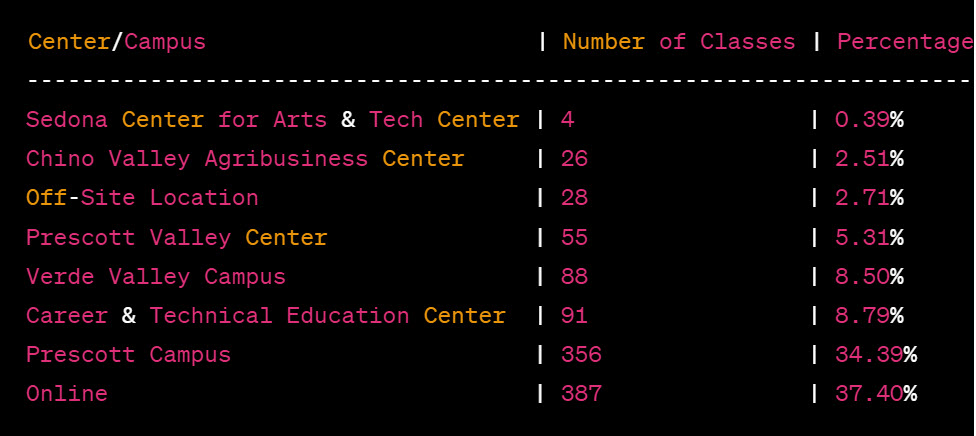
RESIDENTS LEFT “PRETTY MUCH” IN THE DARK AS $10 MILLION EXPANSION DECISION FOR CTEC EMERGES ABRUPTLY; LACK OF INFORMATION SURROUNDING UP TO 20,000 SQUARE FEET EXPANSION AND LAND ACQUISITION RAISES CONCERNS
College shrouds “Sensory Integration Accelerator” project mostly in secrecy; PR Department ignores request for more information; Community caught off guard because of Board’s November 2022 approval in concept of most important capital projects with no mention of expanding CTEC; Moreover, there was minimal disclosure to taxpayers prior to and at the May 2023 budget approval meeting
During the May 2023 Yavapai Community College District Governing Board meeting, where the budget for the upcoming 2023-24 year was approved, one of the most unexpected developments was the decision to allocate $10 million over three years for the expansion of the existing 108,000 square foot, eight-acre Career and Technical Education Center (CTEC). This expansion aims to increase CTEC’s size by an additional 20,000 square feet. The suddenness of this decision caught many attendees by surprise, leaving them with limited information about the specific details and rationale behind the expansion.
 No explanations were provided prior to the May 2023 budget meeting supporting the sudden decision to increase the size of CTEC, especially considering that the College already possesses 108,000 square feet at that facility. Similarly, no clarifications were given regarding why the specific amount of $10 million was chosen, nor was there any disclosure regarding the portion of funding that might come from state grants. Furthermore, it remained unclear whether the $10 million would be spent regardless of the availability of state funding.
No explanations were provided prior to the May 2023 budget meeting supporting the sudden decision to increase the size of CTEC, especially considering that the College already possesses 108,000 square feet at that facility. Similarly, no clarifications were given regarding why the specific amount of $10 million was chosen, nor was there any disclosure regarding the portion of funding that might come from state grants. Furthermore, it remained unclear whether the $10 million would be spent regardless of the availability of state funding.
Another surprising revelation emerged from a confidential executive meeting of the Community College District Governing Board on June 8. During this meeting, a decision was made to acquire a property in Prescott, located west of the airport. The exact purchase price of the property remains undisclosed. The purpose of this acquisition is currently unknown, but there are speculations that it might be intended to expand the footprint of CTEC. The lack of transparency surrounding this decision has left the community uncertain about the college’s intentions with the newly acquired property. (For more information about the purchase, please click here.)
Adding to the residents’ surprise was the fact that the expansion of CTEC was never discussed during the important District Governing Board meeting held November 2022. At this meeting the Board considered all priority projects submitted to them by the College administration and experts hired by the College. The Board then went ahead and approved all of the priority capital projects in concept. Despite the presentation of a detailed chart allegedly prepared by the College experts for that meeting, which outlined the various priority projects and their estimated cost, the CTEC expansion was conspicuously absent from the chart or any discussion.
This is what information the Blog has been able to gather so far:
-
-
-
- At the May 2023 budget approval meeting, page 74 of the budget book states: “Yavapai College will expand the Career and Technical Cetner (sic) (CTEC) by up to 20,000 square feet. Within the expanded space, the college will construct new programs and move a few existing programs to meet Freeport’s current and future workforce needs. Specifically, the space will be used to train technicians with the newest automation and Al technologies.”
- At the May 2023 budget hearing, Dr. Clint Ewell provided the following short explanation for the sudden addition: “Last, but not least, we’ve been working on some leads with the State regarding workforce accelerators, which is some state funded money to help local businesses advance their workforce training skills. So we’re partnering with free Port Mac Moran and putting our name in the hat. We’re hopeful, perhaps even optimistic, that we will get money to help them train their next generation of automation technicians and using artificial intelligence to help diagnose what’s going on with their processes.”
- Finally, Chair Deb McCasland made a vague comment at the end of the budget approval process regarding potential state funds. She said: “And just another point on the capital projects. We are estimating that we will receive 16.4 million dollars to support the capital improvements from outside sources non taxpayer dollars. So we are being very frugal. . . .”
-
-
The Community College’s persistent adherence to secrecy raises numerous concerns. Such opacity undermines the trust that residents have placed in the institution. By choosing to withhold information or failing to meaningfully provide it, such as detailed reasons it suddenly decided to allocate $10 million in taxpayer dollars to a particular project, the Community College not only fails to foster an environment of openness and accountability but also exacerbates the skepticism and unease felt by community members. Transparent and inclusive decision-making processes are essential for building trust and ensuring the collective well-being of all stakeholders.
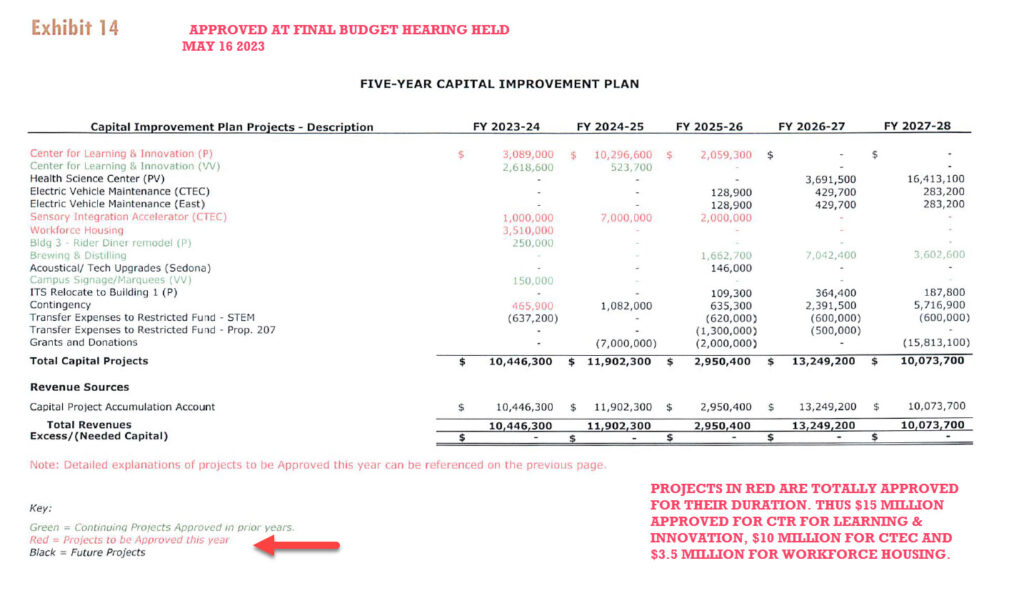
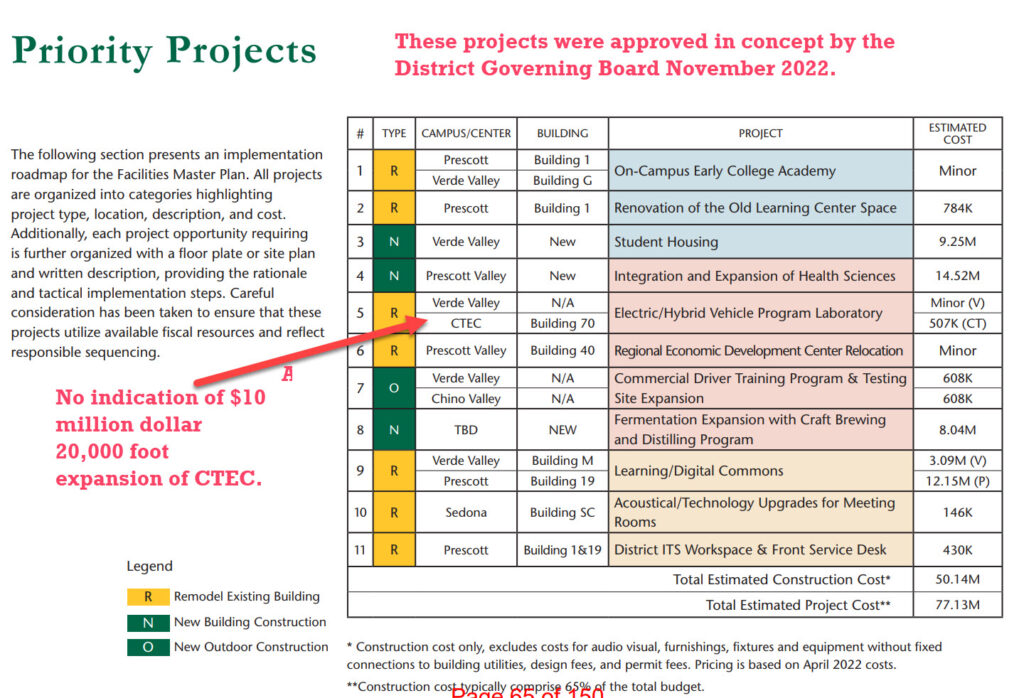
YAVAPAI COMMUNITY COLLEGE ADDS 16 NEW ATHLETES TO ITS MEN’S 25 PERSON SOCCER TEAM
Two (12.5%) of new players from Yavapai County, two from outside the U.S., seven from other Arizona counties outside Yavapai, and five from outstate schools – Total County players on 25-person team roster are three (12%)
 The Yavapai College men’s soccer team has announced its newcomers to the team for the 2023 season. The Roughriders are adding 16 new faces to the roster in addition to nine returning athletes, bringing the roster total to 25.
The Yavapai College men’s soccer team has announced its newcomers to the team for the 2023 season. The Roughriders are adding 16 new faces to the roster in addition to nine returning athletes, bringing the roster total to 25.
The 16 new additions, according to the Community College’s athletic department are:
Nate Claudio | Midfield | Freshman | Yuma, Arizona. High School: Claudio graduated from Cibola High School in May of 2023. As a senior, he helped lead his team to the playoffs with a 10-6-2 record while scoring seven goals and tallying 12 assists enroute to Region Offensive Player of the Year and First-Team All-State honors.
Arthur Coscas | Forward | Sophomore | Paris, Île de France. High School: Coscas graduated from Assumption de Lubeck in June of 2021. Before becoming a Roughrider, Coscas previously attended College of the Canyons.
Jorge Quintero | Forward | Freshman | St. George, Utah. Quintero graduated from Dixie High School in May of 2022. While in high school, he led his team in scoring in back-to-back seasons, earned Region MVP and First-Team All-State honors, was the top scorer in 4A and top-five in assists in the state.
Joseph Miranda | Forward | Freshman | Tucson, Arizona. Miranda graduated from Walden Grove High School in May of 2022. He captained his team and scored 22 goals while tallying 11 assists en route to Region Player of the Year and Region Offensive Player of the Year honors.
Austin Dorsey | Goalkeeper | Freshman | Prescott, Arizona. High School: Dorsey graduated from Prescott High School in May of 2023 where he earned Honorable-Mention All-Region honors.
Anthony Khananisho | Midfield | Freshman | Ontario, Canada. Khananisho graduated from St. Jean de Brebeuf in June of 2023. While there, he earned soccer MVP honors while being on the honor roll.
Carlos Rodriguez | Midfield | Freshman | Chino Valley, Arizona. Rodriguez graduated from Chino Valley High School in May of 2023. While at Chino, Rodriguez played four years of varsity soccer and helped lead his team to state championships during his junior and senior seasons, scoring in each semifinal game and in one of the state title games.
Erick Quirarte | Defender | Freshman | San Luis, Arizona. Quirarte graduated from San Luis High School in May of 2023. As a senior, he helped lead his team to a 16-1 record with 12 shutouts and four goals scored, in addition to earning First-Team All-State and Academic First-Team All-State honors.
Miguel Medina | Midfield | Freshman | St. Johns, Florida. Medina graduated from Bartram Trail High School in May of 2022.
Gael Castro | Midfield | Freshman | Yuma, Arizona. Castro graduated from Cibola High School in May of 2023. As a senior, he captained his team and scored seven goals while tallying four assists en route to First-Team All-Region honors.
David Murillo | Forward | Freshman | San Luis, Arizona. Murillo graduated from San Luis High School in May of 2022. As a senior, he helped lead his team to the state quarterfinals while scoring nine goals and tallying four assists, including a hat trick during the first round of a state playoff game. Before Yavapai: Before becoming a Roughrider, Murillo previously attended Arizona Western College.
Luis Medina | Forward | Freshman | San Luis, Arizona. High School: Medina graduated from San Luis High School in May of 2023. As a senior, he helped lead his team to the state finals while scoring 16 goals and tallying 16 assists en route to First-Team All-State and First-Team All-Region honors.
Gio Orozco | Defender | Freshman | Orem, Utah. High School: Orozco graduated from Timpanogos High School in May of 2022. While there, he earned First-Team All-Region honors twice, competed in the Far West Regionals and went undefeated in P1.
Gabriel Jimenez | Midfield | Freshman | St. George, Utah. High School: Jimenez graduated from Dixie High School in May of 2021. He was a captain during his senior year in which he helped lead the team to a 13-4 record and first-place finish in regionals.
Izaias Santiago | Midfield | Freshman | Phoenix, Arizona. High School: Santiago graduated from North High School in May of 2023. As a senior, he captained the team and helped lead the squad to its first playoff appearance in five years while tallying four goals and 16 assists.
Kodee Karcher | Midfield | Freshman | Ellicott City, Maryland. High School: Karcher graduated from Centennial High School in May of 2023. As a senior, he tallied 18 goals (led the county) and nine assists enroute to Player of the Year, First-Team All-State and First-Team All-Metro honors.
The nine returning players are:
Of the nine returning players from last year’s team, one is from Yavapai County, one from outside the U.S., five from Arizona counties outside Yavapai, and two from outstate. They are:
Sebastian Bielicki, |Midfielder/Defender |Glendale, Arizona. High School: Bielicki graduated from Mountain Ridge High School in May of 2021.
Charles Bettger, | Midfielder | Portland, Oregon. Highschool Valley Catholic, graduated June 2022. As a senior, he scored 11 goals and tallied nine assists enroute to First-Team All-State and League Player of the Year honors.
Aiden Harrell | Forward/Midfielder | Montrose, Colorado. While in high school, he earned First-Team All-Conference honors twice and Second-Team All-Conference honors once while also scoring 27 career goals. His team made the playoffs every year in high school and won the conference twice.
Austin Pearcy | Midfielder | Phoenix, Arizona. Boulder Creek High school. School. Instead of playing high school soccer, Pearcy played for the Phoenix Rising FC MLS Next Academy. In 2021-22, he was the team leader in assists.
Ravi Holladay | Defender : Chino Valley, Arizona. Holladay graduated from Chino Valley High School in May of 2022. As a senior, he helped lead his team to a 21-0-2 record and state championship while also earning all-conference honors.
John Stull | Defender/Midfielder | Hometown Litchfield Park, Arizona. Stull graduated from Millennium High School in May of 2022. While in high school, Stull earned Region Player of the Year, First-Team Defender, Defensive Player of the Year and All-Region Defender honors.
Jesus Torres | Defender | Hometown San Luis, Arizona | Highschool San Luis. During his senior high school season, he earned Second-Team All-Region and Athlete of the Month honors while helping his team to an undefeated record and 6A finals appearance.
Rushon Sandy | Goalkeeper | Hometown San Fernando, Trinidad. Highschool High Mowing School. Sandy graduated from High Mowing School in June of 2022. He was the team captain for his team for three years.
Bishop Rhoads | Goalkeeper | Hometown San Tan Valley, Arizona. Highschool San Tan Foothills. He was a team captain for three years and led his team to its first playoff appearance in 2022 in which he posted a shutout in the first round game. For his efforts, he earned First-Team All-Region Goalkeeper honors.
Source: https://goroughriders.com/news/2023/7/12/mens-soccer-mens-soccer-announces-newcomers-for-2023-squad.aspx
COMMUNITY COLLEGES IN ARIZONA EXPAND WORKFORCE ACCELERATOR PROGRAMS
Accelerator Projects: A Trifecta of Government, Private Industry, and Education Since 2021
 Community colleges in Arizona are witnessing a rise in programs focused on “workforce accelerators.” This initiative gained momentum with former Governor Doug Ducey, who, on March 31, 2021, joined local elected leaders in Pinal County to inaugurate a cutting-edge advanced manufacturing training center in Coolidge, Arizona. Named Drive48, the facility was described as representing a groundbreaking collaboration among government, industry, and academia, aimed at strengthening Arizona’s workforce training for high-tech jobs.
Community colleges in Arizona are witnessing a rise in programs focused on “workforce accelerators.” This initiative gained momentum with former Governor Doug Ducey, who, on March 31, 2021, joined local elected leaders in Pinal County to inaugurate a cutting-edge advanced manufacturing training center in Coolidge, Arizona. Named Drive48, the facility was described as representing a groundbreaking collaboration among government, industry, and academia, aimed at strengthening Arizona’s workforce training for high-tech jobs.
The Drive48 project was also described as complementing the Arizona Advanced Technology Network curriculum, a pioneering partnership developed by Arizona’s employers, public sector, and academic institutions. This collaboration was designed to address the demand for high-tech manufacturing skills both now and in the future. Central Arizona College, one of three community colleges involved, worked closely with numerous manufacturers to develop a unified, industry-recognized curriculum specifically tailored to enhance skills training for manufacturing jobs.
On June 29, 2023, Governor Katie Hobbs of Arizona announced two new workforce partnerships, which will provide advanced skills training in rural areas. These programs, collectively known as Future48, will be launched in Kingman and Yuma, Arizona. They mark the inauguration of the first two of up to six Future48 Workforce Accelerators, overseen by the Arizona Commerce Authority in collaboration with higher education and industry partners.
The Kingman accelerator, established in partnership with Mohave Community College, will support the region’s growing manufacturing, transportation, and mining industries. It will be housed in a state-of-the-art facility spanning over 30,000 square feet at the Kingman Airport and Industrial Park. Notable industry partners include NUCOR Steel, Kingman and Mohave Manufacturing Association (KAMMA), Progressive Pipe, Arizona Sommers Cooling and Heating, and more.
The Yuma Future48 Workforce Accelerator, launched in partnership with Arizona Western College, will provide workforce training in electrical technology, advanced manufacturing, broadband fiber optics, and solar installation, catering to the aerospace and defense industries in the region. The collaboration involves a 5,600-square-foot expansion of the Wellton Manufacturing Training Center located on the Arizona Western College campus.
Furthermore, on July 10, Governor Katie Hobbs announced an investment of $1.7 million in state funding for Pima Community College’s workforce development in science, technology, engineering, and mathematics programs. Pima Community College takes pride in its Automotive Technology and Innovation Center, a two-story, 50,000-square-foot facility opened in 2021. It houses automotive technology programs covering diesel, electric, and autonomous vehicles, providing training for leading brands such as Ford, Fiat-Chrysler, and Subaru. Additionally, Pima Community College’s Advanced Manufacturing facility, valued at $35 million and spanning 100,000 square feet, offers programs in mining technology, manufacturing, metalworking, robotics, machine technology, and more.
YAVAPAI COMMUNITY COLLEGE EMBARKS ON TRANSFORMATIVE LEADERSHIP JOURNEY WITH THREE NEW EXECUTIVES FOR THE UPCOMING FALL 2023 SCHOOL YEAR
New Chief Resource Officer, new head of Workforce Division, and new Provost yet to be selected will join leadership team
Yavapai Community College is set to welcome three new executives to its leadership team as the fall 2023 semester commences. The additions include Dr. Janet Nix, who assumed the role of Chief Resource Officer in November 2022, and Dr. Kimberly Moore, who will spearhead the Division of Workforce and Innovation. Additionally, a third individual will join the team as Provost, succeeding Dr. Diane Jones.
Recall that Emily Weinacker, the former Chief Resources Officer, retired in September 2022. As per her updated LinkedIn page, she has transitioned into a new role outside the College as a “Spiritual Director in Training.” Taking her place is Dr. Janet Nix, whose appointment was officially announced on November 8, 2022. The College has added her to its leadership team.
Yavapai Community College announced in a June 13 press release that it is creating a new Division of Workforce and Innovation. Dr. Moore officially joined Yavapai on July 10, 2023 to lead that Division. Dr. Moore is currently the Vice President for Workforce Innovation at Tallahassee Community College in Tallahassee, Florida. Dr. Moore has also been added to the leadership team.
In a surprising turn of events, Vice President of Academic Affairs, Dr. Diane Ryan, resigned from Yavapai Community College for unknown reasons. Her resignation was confirmed in a press release issued by the College in July 2023. Despite her relatively short tenure, having joined the institution on September 3, 2019, Dr. Ryan leaves behind an exemplary record of remarkable achievements. Following her resignation, the College announced that it would seek a Provost to replace her. It is assumed the new provost will take the seat of Dr. Ryan on the leadership team.
Leadership Team in fall 2022
Anticipated new leadership Team in fall 2023

PLEIN AIR PAINTING WORKSHOP AUGUST 1-3 AT YAVAPAI COMMUNITY COLLEGE’S SEDONA CENTER
Offered by OLLI with workshop to begin at 7 a.m. each day
The Osher Lifelong Learning Institute (OLLI) is offering a three-day “Plein Air Painting Workshop” at Yavapai Community College’s Sedona Center beginning August 1 at 7 a.m. The workshop will the directed by Dawn Sutherland. It will be run August 1-3.
Ms. Sutherland will demonstrate two basic approaches to beginning a painting, using a viewfinder, sketchpad, and thumbnail sketches, designing a good composition, and carrying it through to a nearly finished painting in each session. Topics taught throughout the workshop are values, shapes, and edges. How to capture a sense of distance and depth in a painting, plus working effectively with shadows will be stressed. Students should have good familiarity with their equipment and some previous painting and workshop experience.

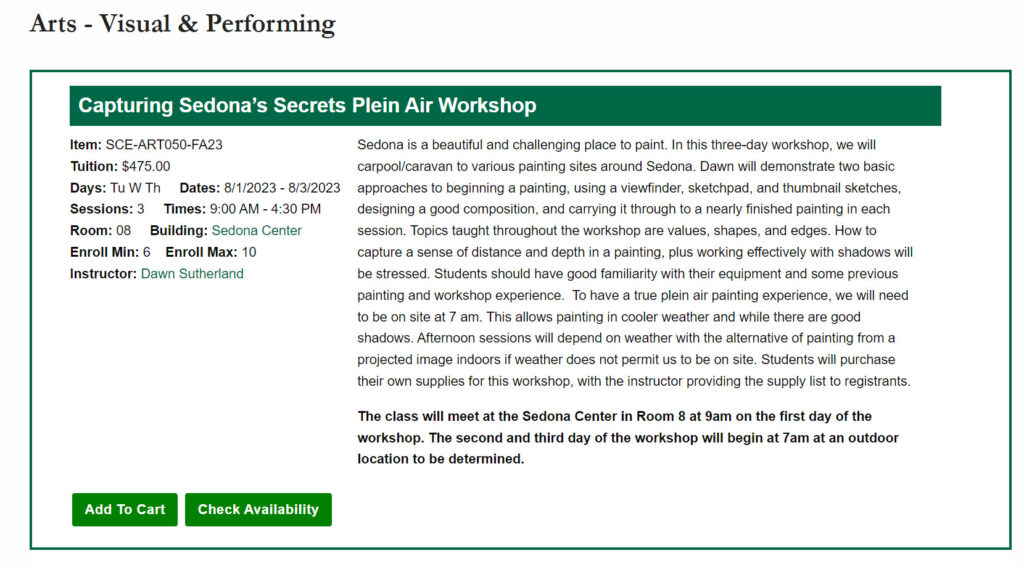
Copyright © 2025 All Rights Reserved
 As Yavapai Community College gears up for the Fall 2023 semester, enrollment data indicates that the nursing program at the Verde Valley Campus has become that Campus’s undeniable magnet. The figures from the last week of July reveal an overwhelming dominance in registrations for the nursing program, with 17 classes either completely filled or nearing full capacity. In contrast, most of the remaining 70 academic offerings are struggling to match anywhere near the interest seen in the nursing program, barring a few exceptions.
As Yavapai Community College gears up for the Fall 2023 semester, enrollment data indicates that the nursing program at the Verde Valley Campus has become that Campus’s undeniable magnet. The figures from the last week of July reveal an overwhelming dominance in registrations for the nursing program, with 17 classes either completely filled or nearing full capacity. In contrast, most of the remaining 70 academic offerings are struggling to match anywhere near the interest seen in the nursing program, barring a few exceptions.